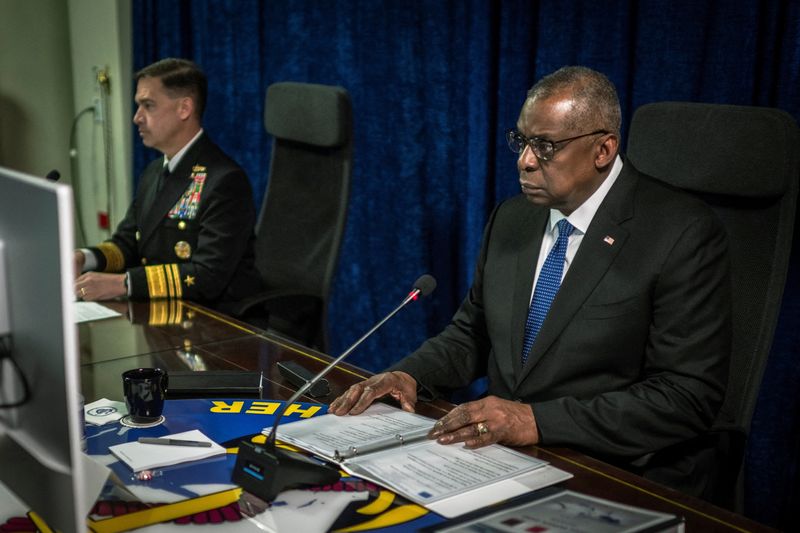WASHINGTON (Reuters) – The Pentagon disclosed on Tuesday that U.S. Defense Secretary Lloyd Austin had surgery to treat prostate cancer in December but then developed complications that brought him back to the hospital, where he has remained since Jan. 1.
Here’s what has been revealed publicly about Austin’s condition and his course of treatment and what experts say about the illnesses affecting him.
WHEN WAS AUSTIN’S PROSTATE CANCER DETECTED AND TREATED?
Austin, who is 70, learned he had prostate cancer in December after routine surveillance for the illness via blood tests to monitor levels of prostate-specific antigen (PSA).
On Dec. 22, 2023, Austin was admitted to Walter Reed National Military Medical Center and underwent prostatectomy, which experts say could involve the complete or partial removal of the prostate and nearby lymph nodes.
Austin was under general anesthesia during the procedure and Walter Reed, in a statement, said he recovered uneventfully from his surgery and returned home on the morning of Dec. 23.
“His prostate cancer was detected early, and his prognosis is excellent.”
WHY IS AUSTIN BACK IN THE HOSPITAL?
Austin returned by ambulance to Walter Reed with complications from the Dec. 22 procedure, including nausea with severe abdominal, hip and leg pain. Initial evaluation revealed a urinary tract infection, the hospital said.
According to the Mayo Clinic, a UTI is an infection in any part of the urinary system, which includes the kidneys, ureters, bladder and urethra.
“If an infection is limited to the bladder, it can be painful and annoying. But serious health problems can result if a UTI spreads to the kidneys,” according to the clinic.
During this stay, Secretary Austin never lost consciousness and never underwent general anesthesia.
Such infections can be taxing.
“Up to one-third of elderly patients hospitalized with UTIs can experience some degree of confusion and reduced awareness of their surroundings,” a researcher from Cedars-Sinai Medical Center in Los Angeles was quoted saying by the hospital.
About 15% to 20% of men undergoing prostatectomy develop urinary tract infections during the post-operative period, with the risk increasing with longer intervals between diagnosis and definitive treatment, according to a large 2023 study from South Korea of men treated between 2007 and 2016.
HOW DID WALTER REED TREAT AUSTIN’S INFECTION?
On Jan. 2, Austin was moved to the Intensive Care Unit for close monitoring and a higher level of care, the hospital said. Further evaluation revealed abdominal fluid collections impairing the function of his small intestines. This resulted in the back up of his intestinal contents.
Walter Reed treated this by placing a tube through Austin’s nose to drain his stomach. The abdominal fluid collections were drained separately.
It was unclear if Austin had robotic laparoscopic surgery, which is considered minimally invasive. But in one recent study of 404 men who underwent minimally invasive surgery using robots to help surgeons remove the prostate and lymph nodes, 7.4% of the patients developed symptomatic collections of fluid in the body.
Austin’s infection has cleared but he remains hospitalized. Walter Reed said it anticipates he will make a full recovery but cautions “this can be a slow process.”
The Pentagon and Walter Reed are not speculating about a possible discharge date.
HOW COMMON IS PROSTATE CANCER?
Prostate cancer is the most common cancer, aside from non-melanoma skin cancer, among American men. Overall, about 1 in 8 U.S. men will be diagnosed with prostate cancer during their lifetime. Most men diagnosed with prostate cancer do not die from it.
The risk of developing prostate cancer varies based on age, ethnicity and other factors. About 6 in 10 prostate cancers are diagnosed after age 65, according to the American Cancer Society.
The risk is higher in African American men and in Caribbean men of African ancestry than in men of other races.
(Reporting by Phil Stewart, Nancy Lapid, Idrees Ali; Editing by Sonali Paul)
